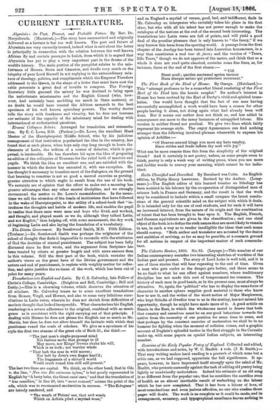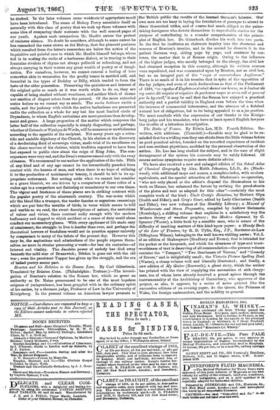Remains of the Early Popular Poetry_ of England. Collected and
edited, with introductions and notes, by W. C. RAOUL 4 vols. (J. R. Smith.)— That easy writing makes hard reading is a proverb of which none but "a critic can, as we had supposed, appreciate the lull significance. It ap- pears, however, to have impressed itself strongly upon the mind of Mr. Hazlitt, who protests earnestly against the tusk of editing old pbetry being lightly or unadvisedly undertaken. Indeed his estimate of an old song is so different from the popular one, that he considers the sacrifice even of health as an almost inevitable •result of embarking on the labour which he has now •completed. That it has been a labour of love, of most conscientious and 01,43k1 jealous affection, no one -who- studies. these pages will doubt. The work is as completeus it couldbe.made,and in arrangement, Accuracy, And Vpographicial excellence loaves nothing to lxi desfrecL 1ft the later volumes seMe-woodcute of appropriate-merit have-been introduced. The name of Bishop Percy associates itself- so
naturally with this class of poetry that we took up these volumes with
some idea of ooniparingntheir contents-PO/1th the well conned pages of our youth. Against suoh..somparison Mr. Hazlitt enters the- protest
oh:milieus silence. No doubt he considers, although to some extent he has ransacked the same 'stores as the Bishop, that the pleasant pastures whicIrreaulted from thelatter's researches are below the notice of the inquisitive and painful race to which Mr. Hazlitt himself belongs, whose
toil is iv scaling the rocks of aterbarous dialect, or in tracing to• their fountains rivulets of rhyme not always pellucid or refreshing, and not always carrying in their 'waters any great wealth of poetry or of imagi- nation. For ourselves, however, we cannot conceal a feeling of love somewhat akin to veneration for the goodly tomes in mottled calf, and beautiful in the types of Dodsley or Dilly, which tended to form the testeoof the 'elder generation. Preserving the quaintness and interest of the original quite as much as it was worth while to do so, they are capable of being studied without weariness, and neither-blush of shame nor emotion of disgust arises from the perusal. Of the-more extended series before-us we cannot say as much. 'The varice lectiones excite a smile, and the jealousy with which the native barbarisms are preserved unfits the collection as a whole for any but the most limited circle of Drydadnsts, to whom English archaisms are more precious than develop- ment And grace. A large proportion of the-matter which composes the latter half ef-the collection especially is simply disgusting, and garbage, whether of Catnach or Wynkyn deWorde, will be nauseous or unwholesome according to the appetite of the-recipient. Not many years ago a scien- tific and amiable dignitary of the Church, in his elation at the discovery of.a deodorizing; fluid of sovereign virtue, made trial of its excellence on the cloaca maxima of his cloister,'which tradition reported to have been lastexposed to public view about the reign of King John. The non- sequences were very sad, and the Dean's remorseceased only with the sway ofweason. • We recommend to onranthor the application of the tale. 'Filth of.- an kind and of any age 'cannot be too hermetioally guarded from contact with the.hannts of men, and when there 'is no hope of utilizing it 'tathaproduction of ,nutrimentor beauty, it should be left'in its ap- propriate ,retirement. But setting- aside what- we -cannot -but consider as a grave blemish, we are driven by a comparison of 'these relics of a ruder age to a comparison not' flattering or consolatory to our own times, The.vigouriand fiesianess of these pieces .are in striking' contrast with the popular poetry of the nineteenth century. The war-notes which stir'tlie blood like a trumpet,. the -tender fancies or sagacious reasonings which are putinteithe mouths of . birds; inverse -which seems to 'trill and warble as we read,' the sweet descriptions of nature; the narrations of valour and virtue, these contrast sadly enough with-the modern buffoonery and doggrel to which accident or a sense of duty-could alone Conduct our-Momentary glance. t--With every applianonof life made easy of attainment; the atingle. to live. is harder than' ever, and perhaps the theoretical horrors. of .feudalierriwCuld, not in "practice 'appear unlovely by comparison to many of the helots of the present day. However this may be, the aspirations -and. admiration of the' people express them- selves_ no More in strainvpossessing aweek—fat less six centuries—of interest and vitality. The Jacobite power of melody has • died. away beneattrthemild star of 'Brunswick ; Dibden is gone out with the old war ;- even the persistent Tripper has given up the struggle, and the era of balialvetry.seems pest.































 Previous page
Previous page